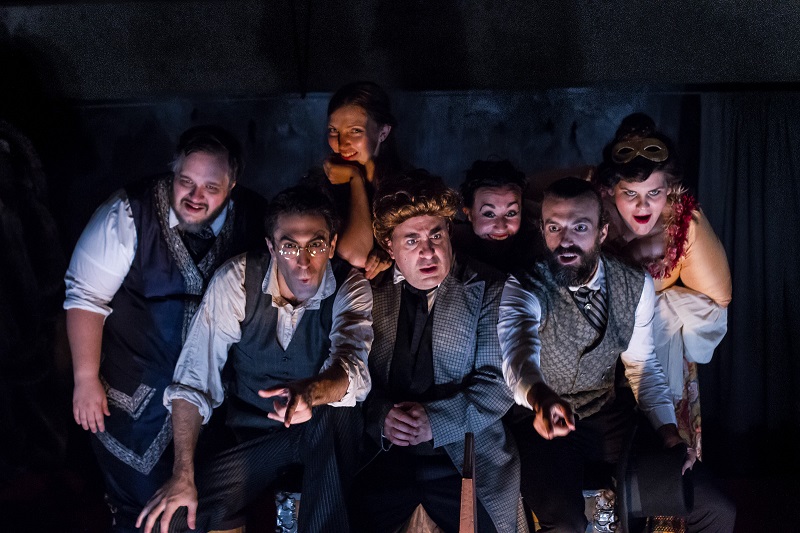
The Black Crook, subtitled An Original, Magical and Spectacular Musical Drama, begins with playwright Charles M. Barras (Steven Rattazzi) stutteringly pitching the play The Black Crook to William Wheatley (Merlin Whitehawk), producing manager of Niblo's Garden, a theater that stood, in several incarnations, on Broadway near Prince Street from 1823-1895. This current production of The Black Crook adapts Barras's 1866 original and weaves throughout the adaptation a frame narrative that tracks the origins and success of what was a hugely influential piece of theater. Wheatley and his business partners combined Barras's melodrama with performances by a Parisian ballet troupe and other spectacular interludes, and the result, because of its single unifying plot, is often credited as the first book musical in American theatrical history (the program notes that the song "I Said to My Love," written by Giuseppe Operti for an 1870 revival, includes the male protagonist's name in an early effort to integrate song and plot). While some dispute the designation of first musical for The Black Crook, no one disputes the fact that it was a tremendous, unprecedented hit, running for 474 performances and in numerous revivals.
Early on, in his pitch, Barras calls his play a fairy story. Borrowing from various sources, including Goethe's Faust, the main plot of his play follows lovers, impoverished artist Rodolphe (Steven Rattazzi, in a more declamatory mode) and Amina (Alaina Ferris), kept apart by a plan to marry Amina to rich Count Wolfenstein (Lizzie Hagstedt, elaborately bewhiskered) and the pursuit of Rodolphe by evil wizard Hertzog (also Merlin Whitehawk, but more crouched and hissing). Hertzog is the Black Crook of the title, and he wants to send Rodolphe's soul to hell in order to extend his own life; Rodolphe, though, unwittingly finds a champion in Stalacta, Queen of the Faeries (Alaina Ferris again, somewhat reminiscent of Cate Blanchett's Galadriel). (If this all sounds a bit over the top, that's part of the fun.) The real-world frame, aside from allowing the production to condense what was once a five-and-a-half-hour event, introduces some clever and illuminating mirroring between the dual plots and through the actors' multiple roles in them (Ferris, for example, plays Barras's sick wife and her acting rival in addition to Amina and the Queen of the Faeries.) The real world and play world are skillfully distinguished by a more naturalistic acting style in the former and a stagier style in the latter. The latter is also marked by heightened foot lighting, and the performers wear exaggerated, or what one is tempted to call theatrical, makeup, both of which elements the small venue brings up close to the audience, highlighting and prompting the spectators to reflect on that traditional artifice.
One of the central thematic links between the dual narratives is made via the device of the Faustian bargain. As Whitehawk's Hertzog sells himself to the infernal powers, so Barras sells himself to Whitehawk's Wheatley. Artistic vision, unsurprisingly, comes into conflict with the cold realities of capitalism. At the same time, however, if we accept The Black Crook as inaugurating a genre, the clash unintentionally births a new theatrical form. The play's engagement with theater history makes the audience more aware of that history, of looking back from our present moment not just on American tradition but over the longer lines of affinity and development. Hertzog and his comic servant sidekick Greppo (Christopher Tocco) are not so different from Ben Jonson's Volpone and Mosca or Christopher Marlowe's Faustus and Wagner of more than 200 years earlier and one continent to the east. The extravagant piling-on of spectacular elements in the original Black Crook echoes the expanding sequence of anti-masques (comic or disordered scenes and dances) that were added to court masques as the 17th century progressed and the genre capered towards the abyss of the English Civil War. It is interesting, too, in thinking about continuities and context, that the musical numbers often sound quite modern, perhaps in part because the instrumental accompaniment is provided by the cast members themselves. "Power of Love," which uses music original to 1866, and features impressive harp and vocals by Ferris as Stalacta, is one example of this. "Our Girls," which in this production alludes to the Crook's unabashed use of then-scandalous costumes for its female performers, is another: written in 1854 by the original Crook composer, its performance here has hints of Tom Waits and the Tiger Lillies about it.
All of this is packaged with lots of comedy, both in the main plots and in subplots such as the romances between Count Wolfenstein's steward, Von Puffengruntz (Randy Blair) and Amina's foster mother, Madam Barbara (Kate Weber), and between Greppo and local girl Carline (Jessie Shelton). There is some pathos seasoning the humor, especially as things draw to a close, and the production also achieves an effective balance between light mockery of and respect for its source material. The cast slips effortlessly among its various characters and keeps them well delineated. Rattazzi makes a fine anchor for the show, eliciting laughs as Rodolphe and sympathy as Barras. Blair and Weber are very funny individually and perhaps even moreso when they play off one another, and Whitehawk's performance includes shrewd details such as the way that Wheatley sits echoing the way that Hertzog walks. Tocco's Greppo has the irrepressible charisma of a character from an Old Hollywood film, and Shelton is equally entertaining harmonizing with the Faerie Queen as one of her subjects or exchanging flirtatious banter with Greppo as Carline. Hagstedt, as businessman Jarret and as Count Wolfenstein, plays variations on the villain as ably within and without the frame story as Ferris does the heroine, whether in the form of wife, virginal beloved, or magical gladiatrix.
Joshua William Gelb and his team have created a thoroughly enjoyable postmodern take on a very significant piece of America's theatrical past. You will learn a little history while having a lot of fun at The Black Crook. - Leah Richards & John Ziegler
